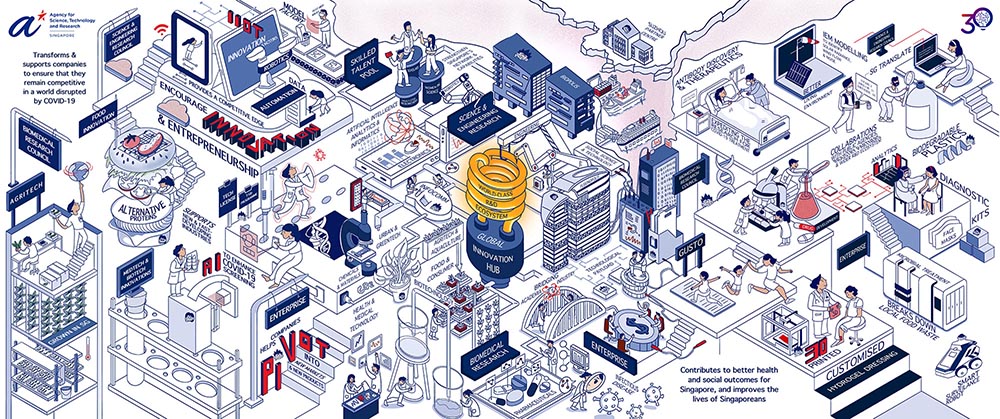Joint Statement In Response To Findings In AGO’s Thematic Audit Of Rie 2025 R&D Grants
The National Research Foundation (NRF) and Agency for Science, Technology and Research (A*STAR) acknowledge the findings of the Auditor-General's Office (AGO) in its thematic audit of the Research, Innovation and Enterprise (RIE) 2025 Research and Development (R&D) grants for FY24/25.
Processes and controls generally in place to ensure proper management of R&D grants
AGO noted that in general, A*STAR and NRF had put in place processes and controls across the various grant stages to ensure proper management of the RIE2025 R&D grants. These included processes to ensure:
- proper approval of funding initiatives (FIs) in alignment with the objectives of RIE2025;
- clear guidance for grant calls as well as evaluation and approval of research projects;
- proper segregation of the duties of processing and approving grants;
- proper checks and approvals for grant disbursements;
- timely and accurate finalisation of projects’ deliverables and accounts.
Nonetheless, AGO also identified areas for improvement to further tighten governance, strengthen accountability and enhance operational processes. NRF and A*STAR have taken immediate steps to address these.
Strengthening documentation and approval processes
AGO noted that some projects did not have properly documented approvals for deviations from the prevailing rates for Indirect Research Costs (IRC) funding, as required under RIE guidelines.
For the projects involving NRF, these had been launched under the previous RIE2020 plan and the prevailing rate at the time of the grant launch had been used, which was aligned with NRF’s policy intent. However, the approval for the deviation from RIE2025 rates should have been made explicit. NRF has obtained covering approvals for all affected projects and updated its guidelines to make clear that the prevailing guidelines at the time of launch of a grant call should apply by default.
Similarly for A*STAR, these RIE2025-funded projects were submitted under the RIE2020 plan. A*STAR has since obtained the necessary covering approvals for its affected projects and confirmed that there was no overpayment or misuse of funds. Internal processes have been reviewed and strengthened to ensure that future deviations are properly documented and approved in line with governance requirements.
Strengthening management of potential conflict of interest and improving financial oversight
AGO highlighted the need to improve documentation of Conflict of Interest (COI) declarations made by reviewers in grant evaluations. For the cases that had not been adequately documented, NRF took immediate steps to follow up with past reviewers to obtain retrospective COI declarations. NRF is also making improvements to its grants management system that would require COI declarations before reviewers can proceed with evaluation of grant proposals.
AGO further noted that NRF officers appointed as ex officio directors on the Boards of research entities had verified or approved fund disbursements to those same entities, which could give rise to potential or perceived conflict of interest. NRF’s intent behind the appointment of selected NRF officers as ex officio directors on the research entities’ boards is to help achieve better alignment between research entities’ programmes and our RIE objectives. Nonetheless, NRF undertook a full review of its COI Management Framework and implemented a revised process that excludes officers holding such ex officio board appointments from NRF’s fund disbursement approval process. The revised Framework has also further clarified the policies on declarations and recusals.
AGO noted that some Funding Requisitions (FRs) and progress reports had been endorsed by Host Institutions’ (HIs) management who were themselves principal investigators of the projects. NRF and A*STAR acknowledge and agree with AGO’s concerns. For funding claims by institutions receiving grants, NRF has now stipulated an explicit rule that funding requisitions may only be endorsed by non-conflicted persons from the institution’s management. A*STAR has similarly revised its standard work instructions to require such progress reports to be re-routed to an alternate endorser and has communicated these updates to all relevant officers. A*STAR has reviewed and verified that the affected reports are in order. A dashboard has also been implemented to monitor endorsements and approvals, with a built-in function to flag and prevent conflicting endorsements going forward.
AGO further observed gaps in A*STAR’s sampling approach for first fund requisitions and noted that some requisitions had been processed without the required verification checks being completed. A*STAR has since manually reviewed the missed first fund requisitions and confirmed that no overpayment was made. A*STAR’s iGrants system – which conducts the sampling and triggers the required manual verification checks – was also updated. In addition, a monitoring dashboard was implemented to track sampling behaviour and ensure the system functions effectively.
AGO also observed that for A*STAR, manpower costs for some seconded researchers were charged to the wrong projects due to human error, although no overpayment occurred. A*STAR has since made the necessary corrections to charge the costs to the correct accounts. The HIs have also reinforced standard operating procedures and conducted targeted training for staff carrying out this function. The errors will be taken into consideration during the performance appraisals of the staff involved, with potential implications on performance bonuses and career progression.
Issuing formal addenda to communicate changes as part of good governance
On communicating to HIs the change in funding modality for two projects, AGO pointed out that issuing formal addenda to the Letters of Award (LOA) was part of good governance and administration. NRF notes that at the time, formal addenda were not a requirement. There had also been proper approval sought for the change in funding modality and clear communication with the Host Institution including proper documentation. That said, NRF agrees with AGO’s point, and has since issued formal addenda to LOAs for these projects, as recommended by AGO. NRF has also developed a standard addendum template for key variations, which is now being used.
NRF and A*STAR remain committed to excellence in governance
NRF and A*STAR take our responsibility to manage public funds very seriously. While the AGO audit did not find any systemic weakness in our overall controls, we will continue to review and improve our procedures and controls to ensure rigorous oversight and management of public funds.
Media Contact
National Research Foundation (NRF), Prime Minister's Office
Michelle Koh
Assistant Head, Corporate Communications
Michelle_KOH@nrf.gov.sg
The Agency for Science, Technology and Research (A*STAR)
Dione Chew
Senior Manager, Corporate Communications
Dione_Chew@a-star.edu.sg
About the Agency for Science, Technology and Research (A*STAR)
The Agency for Science, Technology and Research (A*STAR) is Singapore's lead public sector R&D agency. Through open innovation, we collaborate with our partners in both the public and private sectors to benefit the economy and society. As a Science and Technology Organisation, A*STAR bridges the gap between academia and industry. Our research creates economic growth and jobs for Singapore, and enhances lives by improving societal outcomes in healthcare, urban living, and sustainability. A*STAR plays a key role in nurturing scientific talent and leaders for the wider research community and industry. A*STAR’s R&D activities span biomedical sciences to physical sciences and engineering, with research entities primarily located in Biopolis and Fusionopolis. For ongoing news, visit https://www.a-star.edu.sg.
About the National Research Foundation (NRF)
The National Research Foundation, Singapore (NRF), set up on 1 January 2006, is a department within the Prime Minister’s Office. The NRF sets the national direction for research and development (R&D) by developing policies, plans and strategies for research, innovation and enterprise. It also funds strategic initiatives and builds up R&D capabilities by nurturing research talent. Learn more about the NRF at www.nrf.gov.sg.


.png?sfvrsn=a750a98f_0)






